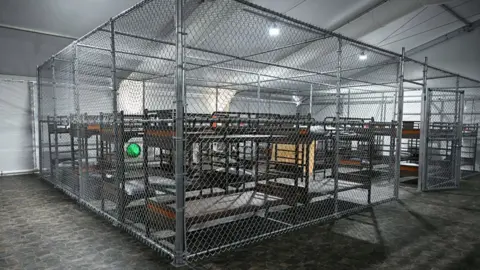The Biden administration has announced a directive that will enforce stricter political reviews for wind and solar energy projects, a move that has sparked concern among industry groups and environmental advocates alike. Under this new policy, the Interior Department will escalate oversight, requiring that over 68 different agency actions related to these renewable initiatives, including environmental reviews and federal permits, undergo scrutiny by higher-ranking officials rather than being managed by lower-level staff.
The Interior Secretary’s office, led by Doug Burgum, will now play a pivotal role in the evaluation process, which proponents believe may enhance accountability. However, critics argue that this could introduce significant delays and create bottlenecks for projects critical for combating climate change. The agency's justification for the directive cites an aim to reduce “preferential treatment” for what it terms "subsidy-dependent" energy solutions.
While federal lands only account for a minor percentage of wind and solar installations, many projects on private lands still rely on consultations with the Interior Department for compliance with regulations involving wildlife and environmental protections. Experts fear that increased bureaucratic hurdles could discourage investment in these projects at a time when swift action is necessary to meet climate targets.
The ripple effects of this policy shift could slow the pace of the renewable energy transition, a crucial component in addressing the escalating climate crisis. Environmentalists emphasize the need for a cohesive structure that supports, rather than impedes, the growth of clean energy infrastructure to ensure a sustainable future for the planet.
The Interior Secretary’s office, led by Doug Burgum, will now play a pivotal role in the evaluation process, which proponents believe may enhance accountability. However, critics argue that this could introduce significant delays and create bottlenecks for projects critical for combating climate change. The agency's justification for the directive cites an aim to reduce “preferential treatment” for what it terms "subsidy-dependent" energy solutions.
While federal lands only account for a minor percentage of wind and solar installations, many projects on private lands still rely on consultations with the Interior Department for compliance with regulations involving wildlife and environmental protections. Experts fear that increased bureaucratic hurdles could discourage investment in these projects at a time when swift action is necessary to meet climate targets.
The ripple effects of this policy shift could slow the pace of the renewable energy transition, a crucial component in addressing the escalating climate crisis. Environmentalists emphasize the need for a cohesive structure that supports, rather than impedes, the growth of clean energy infrastructure to ensure a sustainable future for the planet.




















